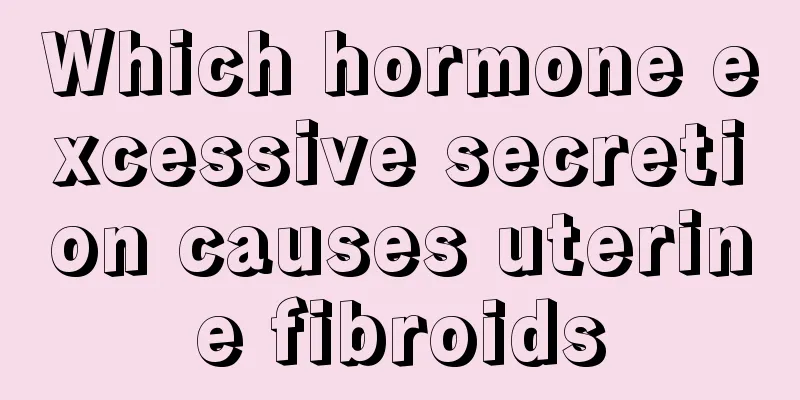Which hormone excessive secretion causes uterine fibroids

|
In recent years, the incidence of uterine fibroids has been getting higher and higher. In fact, the reason why the incidence of uterine fibroids is very high is that most of them are caused by excessive secretion of estrogen in women. Generally speaking, if the estrogen secretion in women's bodies is too high, it is easy to cause some diseases. Although uterine fibroids are benign tumors, they also need to be taken seriously. Severe uterine fibroids will affect women's fertility. What are the symptoms of uterine fibroids 1. Pain: Generally there is no pain symptom. However, when the fibroids undergo red degeneration, when the pedunculated fibroids twist, and when the submucosal fibroids stimulate the uterus to undergo spasmodic contractions. Can cause acute abdominal pain. 2. Anemia: For example, long-term heavy menstrual flow caused by uterine fibroids can lead to secondary anemia. In severe cases, it may manifest as general fatigue, pale complexion, shortness of breath and palpitations. 3. Menstrual changes: Menstrual changes are the most common symptoms of uterine fibroids, which are manifested by increased menstrual flow, shortened or prolonged menstrual periods, and irregular bleeding. Submucosal fibroids can cause bleeding due to increased mucosal area and surface necrosis and infection. When intramural fibroids are larger, the uterine cavity becomes larger, the endometrial area increases, the uterus contracts poorly, or when combined with excessive endometrial hyperplasia, the symptoms are shortened menstrual cycle, increased menstrual flow, and prolonged menstrual period. 4. Increased vaginal discharge: It is common in larger intramural fibroids. Due to the enlargement of the uterine cavity, the glandular secretion increases, resulting in an increase in leucorrhea. When submucosal fibroids are accompanied by infection, the amount of leucorrhea is also high, and sometimes it can be bloody. 5. Compression symptoms: The enlargement of fibroids can compress nearby organs and cause various symptoms. For example, uterine wall fibroids or cervical fibroids can compress the bladder and cause frequent urination, urination problems, and urine retention. Compression of the ureter may result in hydronephrosis. Fibroids on the posterior wall of the uterus can squeeze the rectum and cause difficulty in defecation. 6. Infertility: 25-35% of patients with uterine fibroids may suffer from infertility because the fibroids hinder the fertilized egg from implanting or the fibroids prevent sperm from entering the fallopian tube. |
<<: Can I eat lychees if I have uterine fibroids?
>>: The efficacy and function of the traditional Chinese medicine Rubia cordifolia
Recommend
What are the symptoms of ovarian tumors
In fact, the probability of women suffering from ...
How long can bacteria from a sneeze live in the air?
When the seasons change, if you are not careful, ...
Fight sub-health in spring and learn to take a walk
In fact, this makes sense. In addition to promoti...
What are the symptoms of broken wind?
Tetanus is a very common phenomenon in life. Gene...
The most obvious symptoms of tongue cancer
Everyone knows that fever is the most obvious sym...
Can acupuncture treat myopia and what is the effect?
Nowadays, many people suffer from myopia, and the...
Is tartar powder harmful to the human body?
For many friends who like to make cakes, everyone...
What is immunity
Immunity is a very important part in modern medic...
Daily care for hamartoma
Hamartoma can be divided into several types of di...
What are the benefits of soaking your feet in baking soda
We all know that baking soda is also called alkal...
Can uterine cancer be cured?
Can uterine cancer be cured? Many patients feel h...
Does insulin have to be refrigerated?
Injectable drugs such as insulin must be refriger...
Is fresh Tremella poisonous?
Tremella is a food we often eat. The value of Tre...
Can frozen crabs be eaten
Speaking of crabs, people should be very familiar...
Can the problem of hair loss be cured
The emergence of hair loss problems makes many pe...









